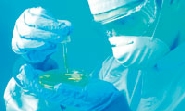People requiring joint replacement surgery could soon have their own cartilage grown in a laboratory and then implanted instead of conventional prostheses thanks to pioneering stem cell research in Bristol.
This form of regenerative medicine may offer doctors the opportunity to help patients with conditions once thought untreatable, such as osteoarthritis sufferers.
This week (Friday 16 September) sees the official opening of the Avon Musculoskeletal Biotechnology Institute (AMBI) Research Laboratories at Southmead Hospital by local MP Doug Naysmith.
The North Bristol NHS Trust hospital site is home to a large and well-regarded orthopaedics department - one of the largest in the country.
Ian Learmonth, Professor of Orthopaedic Surgery, established the Bristol Implant Research Centre at Southmead in 1999 to investigate the effects of using artificial joints made from plastic and metal.
Anthony Hollander, the Arthritis Research Campaign Professor of Rheumatology and Tissue Engineering, who has been looking into growing human cartilage and stem cell research as an alternative treatment, joined him in 2000.
Together, the two academics worked to secure funding from a number of sources to build and equip the AMBI labs, including a new ultra-clean facility.
Invited guests, including the university's Vice-Chancellor Prof Eric Thomas plus representatives from the Wolfson Foundation, Medlock Charitable Trust and the Arthritis Research Campaign (ARC) who have helped support the project, will tour the facility ahead of the official opening ceremony.
Professor Hollander's goal is to conduct the first-ever clinical trials of human cartilage, engineered from stem cells and grown in the ultra-clean labs, within the next few years.
He said: "Cell therapies will be as important in this century as pharmaceuticals were in the last one.
Professor Learmonth said: "We have developed more conservative prosthetic options for today, anticipating biological solutions for tomorrow."
Fergus Logan, chief executive of the Arthritis Research Campaign, which funds Professor Hollander's chair at the University of Bristol, said: "We're very excited about the potential outcome of Professor Hollander's research in helping regenerate cartilage in older people with osteoarthritis, and believe the work has huge potential in improving the treatment of a condition that affects millions of people in the UK.
"The new AMBI labs are a major part of this research programme, so we are delighted that they are now fully functional."
Professor Dorothy Whittington, North Bristol NHS Trust's Director of Education, Research and Development, said: "This new facility reflects North Bristol NHS Trust's commitment to high quality care which is research led and knowledge driven."
